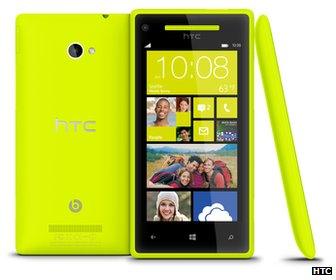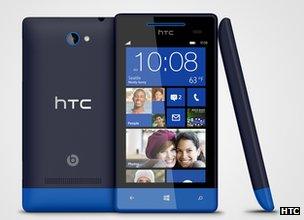HTC unveils two Windows Phone 8 handsets
- Published

HTC said the 8X phone features an 8 megapixel camera and 16 gigabytes of internal storage
HTC has unveiled two Windows Phone 8 handsets at an event in New York.
The firm has said that it intends to promote the 8X, which features a 4.3" (10.9cm) display, as its flagship device alongside the Android-powered One X.
The firm is also offering a smaller 8S model with a 4" (10.2cm) screen.
HTC's share price has fallen more than 50% since February after the firm experienced weak sales of earlier models despite positive reviews.
Analysts have said the firm had a weak advertising campaign which was compounded by the fact that its South Korean rival, Samsung, had a much bigger marketing budget.
Nokia and Samsung have already shown off alternative Windows Phone devices which will launch after Microsoft releases the operating system.
Operator support
HTC said the 8X would launch in 50 countries in early November across 126 mobile operators, while the 8S would be available in 52 countries with more than 146 operators.
Such detail was notably lacking at Nokia's recent Lumia 920 launch, where it did not confirm the date or number of countries the smartphone would be sold in.
HTC chief executive Peter Chou: "We are super confident of this phone"
HTC made much of the devices' design at the US event saying they had "a remarkably unique profile" thanks to the way their edges tapered, becoming thinner at the bottom, to make them feel thin in their users' hands.
It said its top-end model featured an 8 megapixel camera on its rear supported by a dedicated chip for "faster focus speed and clearer, sharper shots". The 2.1MP front camera - used for video chats - has also been designed to provide a wide-angle view.
The firm also hopes to distinguish both models by including Beats Audio sound equipment which it said offered "deeper bass and crisp vocals". The handset maker owns a 25% stake in the company.
The 8X has an NFC (near field communication) chip for touchless payments, but the 8S does not. However, the 8S has a slot for a Micro SD card allowing extra storage, something the 8X lacks.
Tough competition
The bet on Microsoft's technology carries risks - the firm's phone systems only accounted for 3.1% of global smartphone shipments in the April to June months, according to research firm NPD.
But one of the company's analysts said HTC had an opportunity to grow that number.
"The reception from operators is quite good," said Francisco Jeronimo, European mobile devices research manager, told the BBC.
"The market wants another alternative to Android as vendors don't want to face the kind of problems that have arisen out of the lawsuits between Apple and Android device manufacturers - products being withdrawn or delayed.
"But HTC has to compete against Nokia and Samsung which also have Windows Phone 8 products.
"Nokia offers extra services on top such as its transport and augmented reality City Lens facility, while Samsung has a bigger marketing budget."

The 8S uses a lower specification 5MP camera, but is lighter than the 8X
Another analyst praised HTC for the industrial design and materials used to build its new devices, saying they would prove eye-catching on store shelves, but was not convinced that would be enough to improve its fortunes.
"HTC has had problems standing out in the Android market, and it could be even more difficult on Windows Phone 8 as Microsoft controls more of the experience on the platform," said Gartner's research director, Roberta Cozza.
"HTC needs to add further value to the ecosystem similar to what Nokia has done with its imaging and navigation resources.
"Unless that happens I don't suspect things will change a lot for the firm."
HTC's press conference is the last of the big smartphone launches that had been scheduled ahead of the Christmas shopping season.
- Published19 September 2012
- Published19 September 2012
- Published29 August 2012
- Published6 July 2012